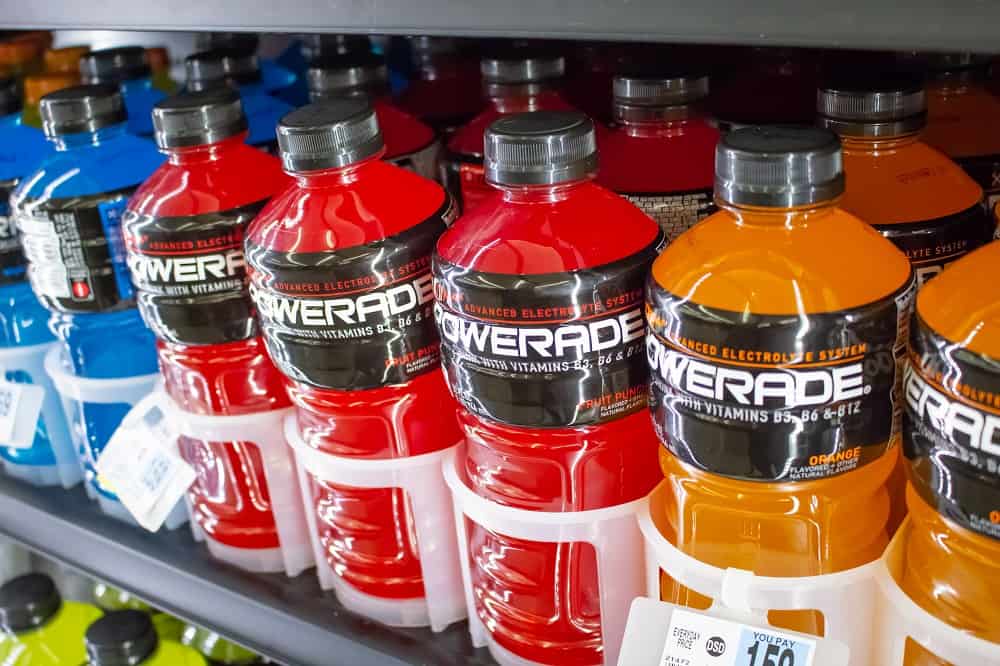Powerade is a popular sports drink manufactured by the Coca-Cola company. It is the company’s competitive product against PepsiCo’s Gatorade. It is a refreshing beverage enjoyed by many people, but along with most products, vegans may be curious whether or not this electrolyte drink is considered vegan.
Based on the ingredient list, Powerade is considered vegan since it does not contain any obvious animal products. However, there are a few ingredients that some vegans take issue with such as food dyes, glycerol ester of wood resin, natural flavors, and sucralose.
Table of Contents
Is Powerade Vegan?

For dietary vegans, Powerade is considered vegan as it does not contain animal products in its ingredients. Even PETA (People for Ethical Treatment of Animals) includes Powerade in their definitive list of vegan beverages(1).
The official website of Coca-Cola states that most of their beverages are vegan and vegetarian friendly, except a few (e.g., Lilt, Schweppes Indian Tonic Water, Costa Coffee Ready-to-Drink Caramel Latte, etc.). The website lists their drinks that contain small traces of fish gelatin that acts as a stabilizer for products using beta-carotene as a coloring agent, contain honey as a sweetener, or contain milk; This list excludes Powerade.
However, there are still strict vegans that avoid Powerade due to some of its ambiguous ingredients.
Powerade Ingredients List
A standard powerade contains the following ingredients(2): Water, high fructose corn syrup, less than 0.5% of: citric acid, electrolytes (salt, magnesium and calcium chlorides, mono-potassium phosphate) natural flavors, modified food starch, calcium disodium edta, mct, saib, vitamins b3, b6, b12 (niacinamide. pyridoxine hydrochloride, cyanocobalamin) blue 1.
*The list of ingredients in Powerade would slightly differ depending on the flavor and the country where they were manufactured.
For the most part, these are all ingredients that a certain population of vegans would readily accept because none of the ingredients listed are animal-based.
However, there are some ingredients that are considered gray areas according to some vegans. These ingredients include natural flavors and blue 1.
Other Powerade flavors also contain questionable ingredients such as sucralose (Powerade Zero) and glycerol ester of wood rosin (Powerade Xion and Ultra Varieties).
Natural Flavors
Natural flavors are considered to be a gray area because of its widely encompassing definition:
“The essential oil, oleoresin, essence or extractive, protein hydrolysate, distillate, or any product of roasting, heating or enzymolysis, which contains the flavoring constituents derived from a spice, fruit or fruit juice, vegetable juice, edible yeast, herb, bark, bud, root, leaf or similar plant material, meat, seafood, poultry, eggs, dairy products, or fermentation products thereof, whose significant function in food is flavoring rather than nutritional.”
FDA
This means that unless an individual contacts the company to inquire or if the company’s website has a thorough FAQ page that declares their natural flavors to be vegan, the vague term of ‘natural flavors’ may or may not be vegan.
Blue 1
Blue 1 (AKA Brilliant Blue FCF) is a synthetic food dye that is used to give the Powerade its blue color. While Blue 1 is synthetic and is not created with an animal derivative, the issues lies in the development of the dye.
Blue 1 was historically tested on animals throughout its development(3, 4). Due to this information, ethical vegans do not consider blue 1 to be vegan. This is because these vegans extend their restrictions beyond their diets and to products that also use animal materials such as fabrics (e.g., leather, wool, fur, etc) and cosmetics.
Other flavors of Powerade use different artificial food color additives that are similar to blue 1 in the sense that they are synthetic and made from vegan ingredients but have been tested on animals during development.
These artificial colors include yellow 5 and blue 1 for the Powerade Lemon Lime flavor, red 40 for the Powerade Fruit Punch flavor, yellow 5 and yellow 6 for the Powerade Orange flavor, and red 40 and blue 1 for the Powerade Twisted Blackberry flavor.
- Red 40 was tested on Rats, Mice(5), and Caterpillars(6).
- Yellow 6 was been tested on rabbits(7), mice, and rats(8).
- Yellow 5 is primarily tested on rats and mice(9).
Glycerol Ester of Wood Rosin
While not present in all flavors of Powerade, some flavors include glycerol ester of wood rosin. Glycerol ester of wood rosin or glycerol ester of rosin, or ester gum on some labels, is an oil-soluble food additive that is used to keep oils in suspension in water.
To make glycerol ester of wood resin, refined wood resin is mixed with glycerin.
Wood resin is typically obtained from longleaf pines (Pinus palustris) and slash pines (Pinus elliottii) and is considered vegan by both dietary and ethical vegans.
The issue is with the glycerin. Glycerin is a thick colorless liquid that can be extracted from two sources: vegetable oil from plants and fat from animals.
Labels rarely make this distinction making it difficult to know whether the glycerin is vegan or not.
Sucralose
Sucralose is an artificial sweetener used in the development of Powerade.
Structurally it is similar to table sugar (sucrose). It is composed of three chlorine atoms where hydrogen-oxygen (hydroxyl) groups would be in a sucrose molecule. As a product synthesized from a lab using sucrose as its main ingredient, it is technically vegan according to dietary vegans.
However, sucralose can be problematic for two reasons: it was reported to have been tested on animals and the refinement process of cane sugar from sucrose may use animal bone char.
Ethical vegans would not consider sucralose to be vegan. Ethical vegans exclude products that are associated with the unethical use of animals in testing the efficacy of products for humans.
Sucralose was reported that an estimated 12,800 animals (dogs, rabbits, mice, and monkeys) died during research involving sucralose.
*Sources for this information are no longer online but can be found via Wayback Machine's Digital Archive:
Since sugar is the primary precursor of sucralose, it is uncertain whether the primary sugar was cane sugar. Cane sugar is problematic in the vegan community as this type of sugar is usually filtered and refined to decolorize the sugar into the desired white color.
The problem stems from the filtration method being used. While the filter can be vegan such as granular carbon or an ion-exchange system, a common filter used by the sugar industry is animal bone char – a product made from bones of animals, usually cattle.
References:
3. https://www.efsa.europa.eu/
4. https://www.sciencedirect.com/




